Other slavery reports
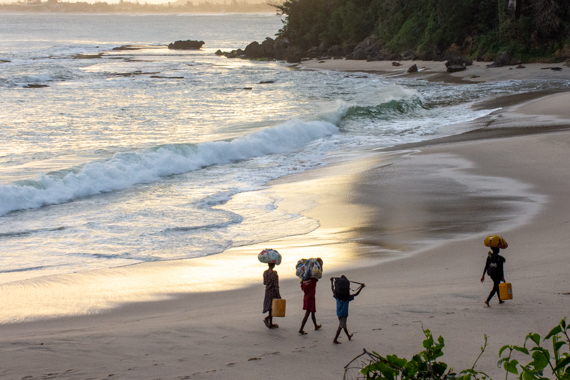
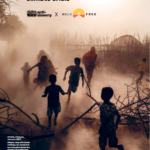
The Costs of the Climate Crisis
Anti-Slavery International co-authored an essay with Walk Free for the Global Slavery Index – see the original article here in the Global Slavery Index.
Compounding crises serve to heighten the risks of all forms of modern slavery. The COVID-19 pandemic, armed conflicts, and climate change have led to unprecedented disruption in employment and education, as well as increases in inequalities, distress migration, and reports of gender-based violence and forced marriage. Anti-Slavery International and Walk Free look at the connections between climate change and modern slavery and provide recommendations for governments.

Evidence submission to the UK Environmental Audit Committee on Uyghur forced labour in electric vehicle supply chains
Anti-Slavery International
In written evidence to the UK’s Environmental Audit Committee, we urge the Committee to recognise and assess the risk of the use of forced labour of Uyghurs and other Turkic and Muslim-majority peoples in the solar industry and energy storage technology industries, and to develop recommendations which map out a pathway for how the UK Government can support the UK solar industry to develop a truly ‘clean’ industry, which does not rely on the systemic forced labour of persecuted communities.
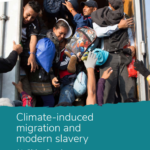
Climate-induced migration and modern slavery
Anti-Slavery International partnered with the International Institute for Environment and Development (IIED) to publish a report exposing the relationship between climate change, forced migration and modern slavery. The report finds that climate change heightens existing vulnerabilities of slavery and that there are three emerging pathways linking climate change, migration and modern slavery: sudden events in the aftermath of disasters, slow onset events/disasters, and slow onset events combined with conflict and forced displacement.
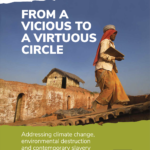
From a vicious to a virtuous circle: Addressing climate change, environmental destruction and contemporary slavery
Climate change is a global crisis with serious implications for all of humanity. For people who are vulnerable to exploitation, it can be especially serious: climate change can drive a vicious circle that traps people into working in industries that contribute to environmental harms, which can in turn intensify the conditions that leave people vulnerable. In our research report, author Dr Chris O’Connell, CAROLINE Fellow at Dublin City University, examines the causes and effects of climate-linked modern slavery, and identifies practical recommendations for policy makers to tackle the problem.
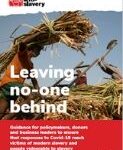
Leaving no-one behind: Insights and recommendations for donors, business and policymakers
Anti-Slavery International.
Covid-19 has the potential to negatively affect everyone, but it does not affect everyone equally. This report includes insights and recommendations for policymakers, donors and business leaders to ensure that responses to Covid-19 reach victims of modern slavery and people vulnerable to slavery, along with short and long term measures to build resilience and prevent an increase to modern slavery.
February 2019: submission to the UN Human Rights Committee on Niger
A joint submission by Anti-Slavery International and Timidria to the UN Human Rights Committee (hereafter the Committee) ahead of its examination of Niger’s second periodic report to the International Covenant on Civil and Political Rights. It provides information on descent-based slavery, the wahaya (so-called 5th wife) practice, worst forms of child labour in Niger including forced child begging of talibés (children who study at residential Quranic schools, daaras) and child domestic work, and stigma and discrimination against people of slave descent.
Joint submission to the UN Committee on the Elimination of all forms of Discrimination against Women – on the UK
This joint submission to the Committee on the Elimination of all forms of Discrimination against Women by five civil society organisations: Anti-Slavery International, the Anti Trafficking and Labour Exploitation Unit (ATLEU), the Anti-Trafficking Monitoring Group (ATMG), the Human Trafficking Foundation (HTF), and Kalayaan, outlines gaps in UK’s response to modern slavery: including the identification, protection and support provided to victims; barriers in access to legal advice, justice and remedy; and flaws in the legal and policy framework relating to migrant domestic workers, which renders them particularly vulnerable to abuse, exploitation, and trafficking.
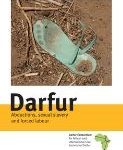
Darfur Abductions: sexual slavery and forced labour
Darfur Consortium: An African and International Civil Society for Darfur.
Research by the Darfur Consortium has found that Government supported militia, like the Janjaweed and the Popular Defence Forces, together with the Sudanese Armed Forces, have systematically abducted civilians for the purposes of sexual slavery and forced labour as part of the Darfur conflict. The report investigates the pattern of abductions, the issues behind them, including ethnicity and lack of protection, and concludes with some recommendations to address the abductions.
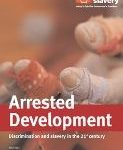
Arrested Development: Discrimination and slavery in the 21st Century
Anti-Slavery International, Mike Kaye.
Discrimination is a pivotal part of slavery because it allows people to disengage their humanity and justify or tolerate the violation of other people’s human rights. Discrimination also limits certain groups’ access to education, jobs and healthcare, leaving them to subsist at the margins of society where they are extremely vulnerable to enslavement as they look for ways to provide for themselves and their families. This publication highlights what action needs to be taken by governments and other international agencies to ensure that every human being – without exception – should be able to live a life free from slavery. ISBN:978 0 900918 66 7
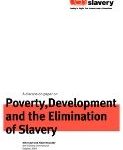
Poverty, Development and the Elimination of Slavery
Anti-Slavery International, Mike Kaye, Aidan McQuade
Discussion paper.
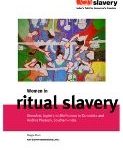
Women in Ritual Slavery: Devadasi, Jogini and Mathamma in Karnataka and Andhra Pradesh, Southern India
Anti-Slavery International, Maggie Black
This report looks at the ritual slavery practices of Devadasi, Jogini and Mathamma in Karnataka and Andhra Pradesh in southern India. These practices involve the dedication of young girls to a deity and their subsequent sexual exploitation by one or many men from the community. The report analyses the problem and considers responses to the problem to date and what more needs to be done.
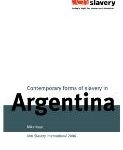
Contemporary Forms of Slavery in Argentina
Anti-Slavery International, Mike Kaye.
This report provides information and analysis in relation to slavery practices in Argentina, with a particular focus on trafficking of people for both labour and sexual exploitation and the commercial sexual exploitation of children. Also available as a PDF download in Spanish.
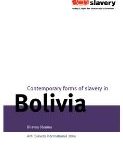
Contemporary Forms of Slavery in Bolivia
Contemporary Forms of Slavery in Bolivia
This report provides information and analysis in relation to slavery practices in Bolivia, with a particular focus on forced labour and worst forms of child labour in the sugar, nut and mining industries and on private ranches.
Bhavna Sharma
Anti-Slavery International 2006
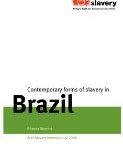
Contemporary Forms of Slavery in Brazil
Anti-Slavery International, Bhavna Sharma.
This report provides information and analysis in relation to slavery practices in Brazil, with a particular focus on forced labour in the Amazon, trafficking of people for both labour and sexual exploitation, and child domestic work.
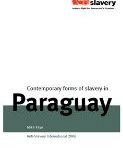
Contemporary Forms of Slavery in Paraguay
Anti-Slavery International, Mike Kaye.
This report gives an overview and analysis of different slavery practices in Paraguay, including forced labour of indigenous people, trafficking in people, the commercial sexual exploitation of children, child domestic work and child soldiers. Also available as a PDF download in Spanish.
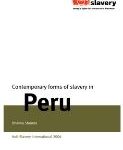
Contemporary Forms of Slavery in Peru
Anti-Slavery International, Bhavna Sharma.
This report provides information and analysis in relation to slavery practices in Peru, with a particular focus on forced labour in the Amazon, domestic work, trafficking of women and children for sexual exploitation, and children working in mines.
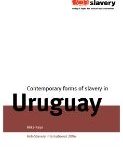
Contemporary Forms of Slavery in Uruguay
Anti-Slavery International, Mike Kaye.
This report provides information and analysis in relation to slavery practices in Uruguay, with a particular focus on the commercial sexual exploitation of children, the worst forms of child labour, and trafficking of people.
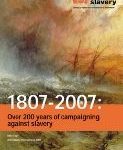
1807-2007: Over 200 years of campaigning against slavery
Anti-Slavery International, Mike Kaye.
This publication gives an overview of the Transatlantic Slave Trade and considers the factors that led isolated voices of protest to develop into a popular movement in less than 20 years, helping to bring about the abolition of the slave trade in 1807. It also traces how after the end of the Transatlantic Slave Trade, new forms of slavery began to manifest themselves and how they were challenged through popular campaigns and the development of international standards to prohibit them. It also considers what action needs to be taken to free the millions of people in slavery today. ISBN 0 900918 61 6
Abolishing Slavery and its Contemporary Forms: Weissbrodt Report
Paper prepared by David Weissbrodt and Anti-Slavery International.
Office of the United Nations High Commissioner for Human Rights 2002
Ref: HR/PUB/02/4
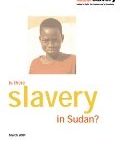
Is there Slavery in Sudan?
Anti-Slavery International.
This report summarises information obtained during a fact-finding visit to investigate abductions and slavery in Sudan. It includes illustrated case studies and the Sudan Government’s response.